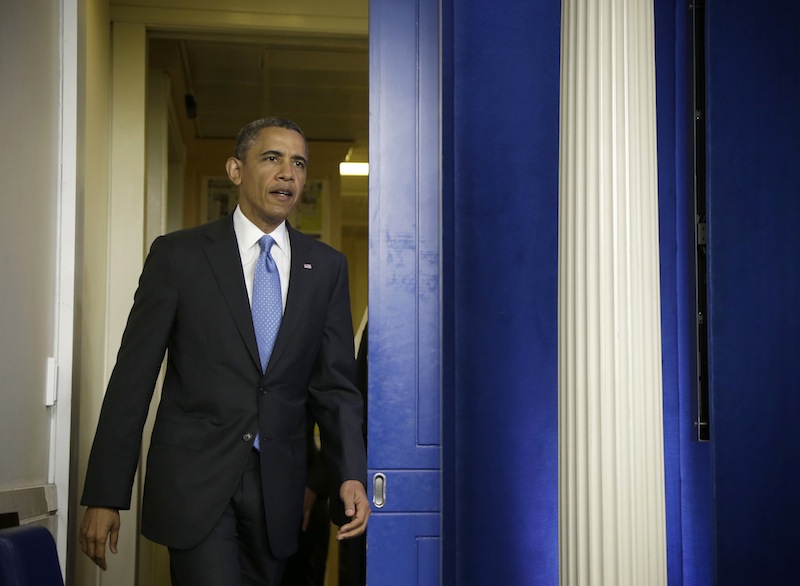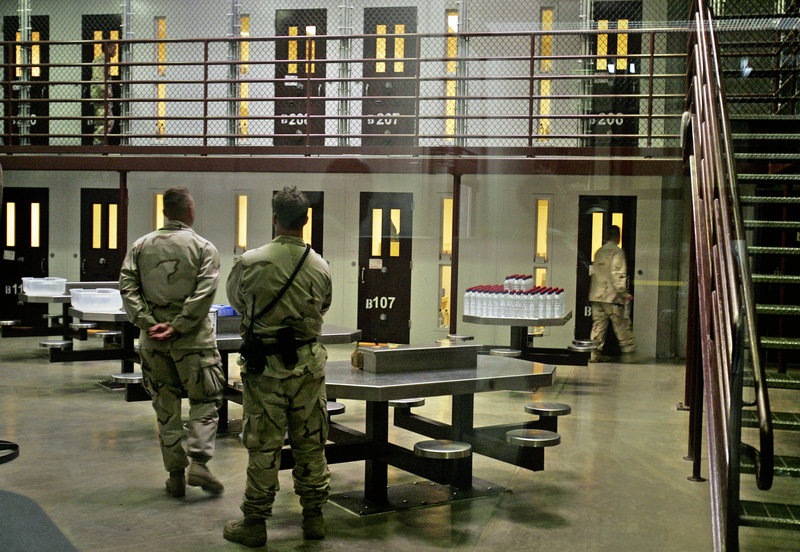WASHINGTON — President Barack Obama on Tuesday renewed his pledge to close the prison for terrorist suspects at Guantanamo Bay, Cuba, but the impediments that have thwarted him thus far remain.
At a White House news conference, Obama said he would try to persuade Congress to end restrictions that have prevented him from closing the facility. The president’s comments followed the arrival Monday of medical reinforcements at the U.S. naval prison to help deal with a hunger strike by about 100 of the 166 detainees there. The forced feeding of detainees has refocused human rights concerns on the issue.
“I don’t want these individuals to die,” Obama told reporters.
He added that the situation was “not sustainable” and that he had asked advisers to review it. He also said he would press the issue with lawmakers.
“I’m going to re-engage with Congress to try to make the case that this is not something that’s in the best interest of the American people,” he said.
Obama first vowed to close the prison while campaigning for president ahead of his 2008 election. But after Congress passed restrictions on the transfer of detainees to the United States and other countries, the president largely abandoned the issue.
Obama has transferred many prisoners from Guantanamo to other countries and has called for moving the remaining detainees to maximum security facilities in the United States.
But the lawmakers, mostly Republican, who blocked Obama’s push to close the facility in his first term remain no less committed to keeping it open and there is no public clamor to do so. Lawmakers opposing the closure have express concern about security and have argued that the rules of civilian courts are not appropriate for terrorism prosecutions.
Despite Obama’s pledge to make another run at closing Guantanamo, the president was vague about how broad an effort he planned. And it was unclear how much political capital he was willing to spend on the vexing issue, particularly if it distracts from other second term priorities like overhauling immigration laws or seeking a “grand bargain” deficit-reduction deal.
A renewed push to close the detention center would cheer liberals who long have been frustrated over Obama’s failure to make good on his promise to shutter Guantanamo. However, Obama hasn’t had the full support of his party on this issue, with some Democrats joining Republicans in blocking efforts to transfer detainees to U.S. prisons.
Obama’s push also comes just weeks the April 15 bombings in Boston that killed three people and injured hundreds more. In the aftermath, some lawmakers have called for trying the surviving bombing suspect as an enemy combatant like the Guantanamo detainees, despite his American citizenship.
Human rights organizations welcomed Obama’s renewed call to close the facility but urged him to do more right away. Amnesty International said Obama has not transferred some detainees that he could even under congressional restrictions.
“It’s time to do more than talk,” Zeke Johnson, director of Amnesty International USA’s Security with Human Rights Campaign. He said Obama should show he is serious by appointing a high-level official to focus on closing the facility.
The focus has turned back on conditions at the facility because of the hunger strike that began in February by detainees who have spent years in Guantanamo without trial and seemingly without hope of a resolution from Washington. At his news conference, Obama acknowledged their situation.
“The idea that we would still maintain forever a group of individuals who have not been tried, that is contrary to who we are,” he said. “It is contrary to our interests, and it needs to stop.”
Send questions/comments to the editors.




Comments are no longer available on this story